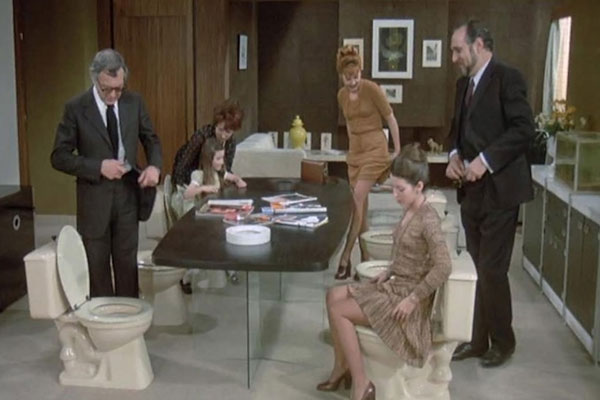If you happen to be searching for films that feature food, there are no shortages of places to look. Just about every pop culture magazine and blog has a listicle of food in film. These range from movies like Babette’s Feast (where a dinner is a labor of love), to Marie Antoinette (where it symbolizes decadence), to Last Tango in Paris (butter). The Czech film Daisies (1966) features some very messy interactions with food (culminating with a young lass using a formal dinner table as a catwalk), and Sweet Movie features actual Viennese Aktionists sharing a gross-out meal in a commune.
One place that is less obvious is the work of Luis Buñuel. Three of his films feature dinner parties where the desire to eat is somehow thwarted. Unfulfilled desires were a theme in his work from his first film, Un Chien Andalou (1929). The work that followed spanned many genres including musicals, a documentary on The Vatican, comedies, adaptations of classic books (Robinson Crusoe, Wuthering Heights), and a variety of films that would be unclassifiable if the adjective “Bunuelian” didn’t exist. According to IMDB he directed 35 films and wrote 42. He made them “for his friends” and cared mostly about their reactions, positive or negative. He came from a wealthy family, was devoutly religious until age 16 (His early religious training makes his attacks on religion especially well-informed and powerful), and he got his start—like most of the later French New Wave directors—by writing about film.
The first of his dinner-party-gone-wrong films was Exterminating Angel (1962). This one was shot in Mexico, but it wasn’t tailored for mainstream Mexican audiences. When a wealthy couple throws a dinner party, the servants flee the house before the guests arrive. The dinner guests find themselves unable to leave the dining room (in a hauntingly psychological/supernatural way). As the evening turns into a period of days, they kill a sheep that had been intended as an amusing decoration and roast it over a blaze of various furniture pieces. For water, they tear up the wall to tap into a pipe, which creates a fountain. The second film to address the unrequited dinner party theme was The Discreet Charm of the Bourgeoisie (1972), in which three couples attempt to have a meal together but keep getting interrupted by increasingly surreal circumstances, which include terrorists, an absent-minded hostess, the restaurant owner’s death, and unexpectedly finding themselves on stage. Much of the film involves the three couples walking along deserted roads between thwarted dinner parties. The Phantom of Liberty (1974) contains his most iconic dinner party. The guests are seated around a dinner table on flush toilets (he stated in interviews that he adored American plumbing) with the guests rushing off to water closets to eat. So, gather round the table on the porcelain throne of your choice. Dinner isn’t served.


